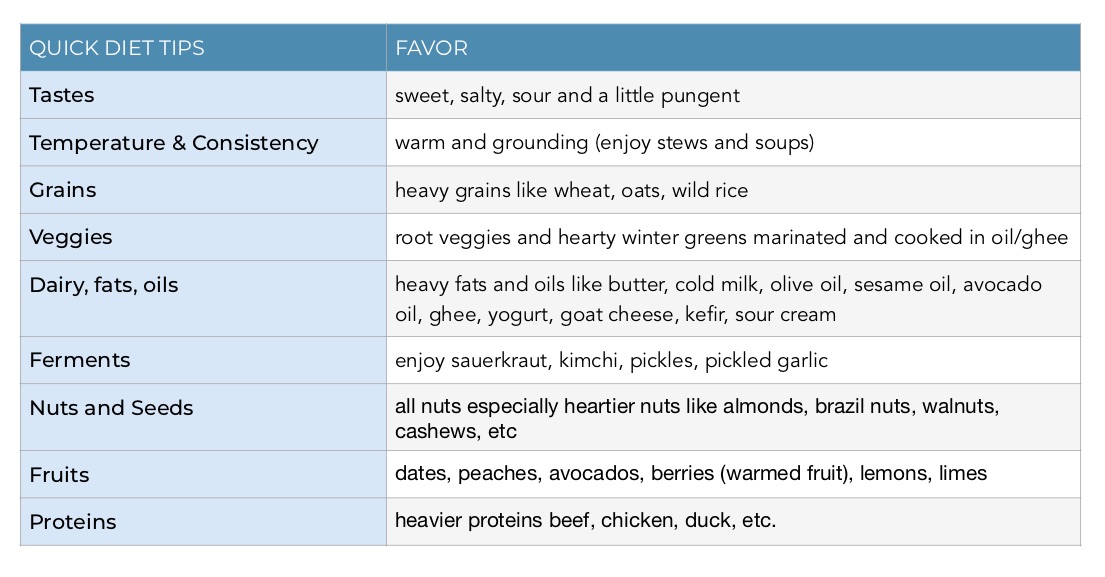Ayurvedic tips for the Northern Hemisphere
february diet guide

As we shift into February in the Northern Hemisphere, it’s very cold and dry, especially if you are spending a lot of time indoors in dry heat. Winter is governed by the elements of wind and air that have cold and dry properties, this season is referred to as vata season. If you carry a lot of vata in your constitution, you may notice dry skin, chapped lips, popping joints, a chill to the bone, lighter sleep, difficulty with elimination, and emotions such as fear, stress, or anxiety rising. In order to find balance in the mind body sense complex during this time it is helpful to cultivate qualities that are opposite of cold and dry by getting warmer, moist, and grounded.
If this is not the case and you notice more kapha type tendencies starting to come up as the snow is melting and the earth become sopping wet with mud then check out the March guidelines here. You can recognize kapha in the body as a feeling of sluggishness, lethargy and couch potatoism. Depression, slow elimination, excess water weight and mucus are all signs that your body has a kapha imbalance.
Back to VATA (get your vata tipsheet here): You can balance vata with diet by eating warmer soups and stews, heavier proteins, nuts, and fats, and incorporate the sweet, sour, and salty tastes into your diet. The other 3 tastes, pungent, bitter, and astringent are stimulating and aggravate vata dosha. So support the self with warmth and moisture by enjoying the sour, sweet, and salty tastes…and put a little pungent in there too to warm the body and support your transition into the moist months coming up.
To get the sweet taste: enjoy grains and root veggies like potatoes, turnips, rutabaga, and carrots. These foods are generally heavier and more oily which also help to balance vata dosha. When vata is vitiated our nervous system gets aggravated and this makes it becomes harder to sleep and handle stress. Sweet is cooling and it has a calming effect on the nervous system that can help you ground down.
To warm up the body, enjoy foods that are sour and salty. These will heat up and strengthen your digestion. The sour taste will also help to cleanse the liver as you come out of your holiday feasting. Experiment with foods like sauerkraut, kimchi, and pickles. Enjoy sour cream, yogurt, and sip on some kefir or kombucha. Our digestive tracts have evolved over time to digest these in winter, they are part of the process of storing food for winter and they support jathara agni (our digestive fire). In addition, the fermentation has anti-bacterial properties that can help keep your immune system strong. These same foods may not be as good for you in the summer if you air on the hot side. Other sour foods include lemons/limes and fruits like grapefruit, and oranges are also good now too.
To add that little bit of pungent, try some ginger. While pungent/spicy foods are typically stimulating for vata, ginger has special properties that make it tridoshic (meaning that it can help balance all body types). It’s great for digestion, circulation, thinning mucus, building immunity and it has antimicrobial properties. A quick pre-meal stimulant I learned from Dr. Lad is to slice some dime sized pieces of ginger, throw a little rock salt on it, and squeeze a little lemon/lime on it. Enjoy a couple pieces of this right before a meal to stimulate your digestion and get a quick boost of the salty, sour, and pungent taste in.
Keep it organic, keep it local and remember the importance of how you eat too. Slow down, relax, chew slowly and enjoy the warm, cooked foods as we start to near the end of winter. Remember that food is medicine and can be used as part of your sadhana (spiritual practice) to help you cultivate balance in body, mind, and spirit.

